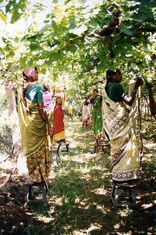
Indian grapes tested by the Pesticides Safety Directorate (PSD) in the UK this year had no pesticide residues above maximum residue levels (MRLs), thanks to greatly improved residue-monitoring processes at source.
Samples of Thompson Seedless tested by the PSD were exported by Shivprakash Agro Exports, Hari Om Agro Exports, Vijayshree Exports and Indyglobal Ventures.
The promising results are due, in part, to the work of the Indian Agricultural & Processed Food Products Export Development Authority (APEDA), which developed its monitoring plan to cover all growers producing grapes for export. The project involved exporters registering every grower supplying them by district branches of APEDA in the main growing areas of Andhra Pradesh, Maharashtra and Karnataka. Dhananjay Wardekar, agriculture officer at APEDA, said: “We have set the target of exporting 30,000 tonnes of grapes in the current season. Substantial revenue will be generated if the export target is achieved.”
Agronomists at the APEDA branches record and maintain all data, with registrations renewed each October. And APEDA only grants phytosanitary certificates for export consignments drawn from the registered farms that have been tested. As part of the plan, eight laboratories, including the National Research Centre for Grapes in Solapur, were recognised for issuing the pesticide residue certificates.
These developments mark an important step forward in India’s development as an exporter since 2003, when several alert notifications for Indian grapes were issued by EU authorities for MRL exceedances.



